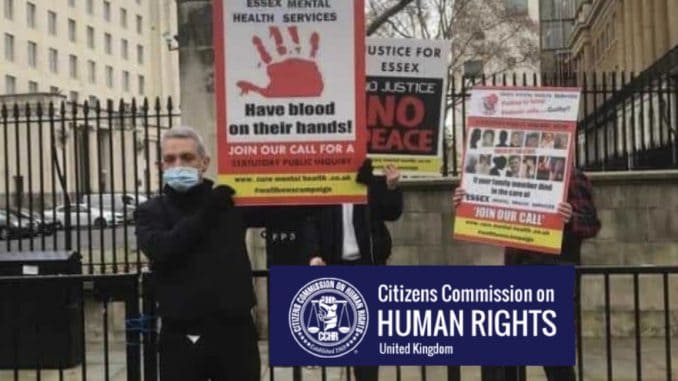
11 December 2020
Statutory Public Inquiry into Essex mental health services
When things go wrong in the mental health system, there’s a default setting used by psychiatrists – they blame the patient.
Whether overtly or covertly, psychiatrists consistently refer to a person’s mental condition, their lifestyle choices, or any other frowned-upon aspect of their existence, designed to deflect from their own clinical practice that may have contributed to a person’s demise.

Since the death of her 20-year-old son Matthew in November 2012, Melanie Leahy has been searching for answers to uncover what happened. After just seven days detention at the Linden Centre in Chelmsford, Matthew was found hanged. Over the years, her dedicated and tireless search has expanded as more families joined her initiative for the truth. As the numbers grew, it became clear that there have been systemic failings resulting in multiple fatalities.
As a consequence, mental health services in Essex became the subject of an investigation by the Health and Safety Executive. In September 2020, a prosecution was brought against Essex Partnership University NHS Foundation Trust (EPUFT) following an investigation into North Essex Partnership University NHS Foundation Trust (NEPUFT). The subject of the prosecution related to the potential ligature points in inpatient wards under the management of NEPUFT.
On 12 November 2020, EPUFT pleaded guilty at Chelmsford Magistrates Court to failures of care involving the deaths of 11 patients. While an exoneration of the very real concerns expressed by bereaved families, it was only the tip of the iceberg in terms of accountability.
Some 55 families and growing have come forward following media articles, TV news reports and social media coverage, adding weight to the ever-increasing body of reports against mental health services in Essex. It’s not a good picture.
Since Matthew’s death, Melanie Leahy has remained consistent in her call for a Statutory Public Inquiry as a robust measure to uncover all of the failings. By blaming individual patients and their lifestyles when things go wrong, psychiatrists and other mental health professionals have successfully avoided accountability. When there are multiple failings and multiple suicides however, the psychiatric blame game simply doesn’t work.

A petition into Matthew’s death calling for a Statutory Public Inquiry finished in November 2019. It garnered over 100,000 signatures and automatically became the subject of a parliamentary debate. On 30 November 2020, Nadine Dorries, the Minister for Mental Health, Suicide Prevention and Patient Safety, announced an Independent Inquiry would be commissioned.
This announcement however was a setback. An Independent Inquiry is not robust in the same way as a Statutory Public Inquiry which has ‘teeth.’ Any person or organisation can be made to produce relevant documents in such an Inquiry and it is a criminal offence to intentionally withhold a document required by the Inquiry or deliberately to obstruct its work. An Independent Inquiry doesn’t carry that same weight, giving culpable personnel the opportunity to avoid accountability.
While ligature points and poor management were the focus of the investigation following Matthew Leahy’s death at the Linden Centre, there was a failure to address the clinical care and performance of the psychiatrist responsible for his care.
Psychiatric prescribing habits can produce paradoxical effects. There is a generally accepted yet erroneous narrative regarding the efficacy of psychiatric drugs. When forcibly administered to a detained individual, they have the potential to create iatrogenic conditions including motor restlessness that can manifest as disturbed or even suicidal thoughts and suicidal behaviour.
This is where psychiatrists blame the person and their purported condition. This is where discerning investigators need to look more closely. This is where the effects of psychiatric drugs should be closely scrutinized to see how they have the potential to create the very difficulties they are prescribed to treat. Those effects include violence, aggression, suicidal thoughts and suicidal behaviour.
As well as hospital management, liability should also lie with the consultant psychiatrist, also referred to as the Responsible Clinician. He or she has overall responsibility for the care and treatment of people being assessed and treated under the Mental Health Act. With this in mind, their prescribed treatment must be an additional focus of any investigation, especially when fatalities occur.
The common management mantra when things go wrong is that “lessons have been learned.” It’s a mantra that’s entirely unacceptable. In the case of Essex mental health services, if lessons had been learned, there would not be multiple failings.
CCHR UK wholeheartedly supports Melanie and all of the bereaved families in their call for a Statutory Public Inquiry. The pursuit of the truth is often met with opposition and it’s on that basis that the truth, the whole truth, and nothing but the truth is still to be heard.
Letter of support written to Mr Boris Johnson
Credit CCHR
